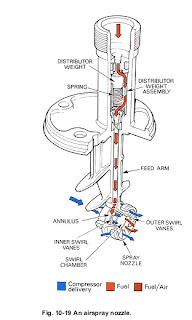FUEL HEATING
100. On many engines, a fuel-cooled oil cooler (Part 8) is located between the L.P. fuel pump and the inlet to the fuel filter (fig. 10-13), and advantage is taken of this to transfer the heat from the oil to the fuel and thus prevent blockage of the filter element by ice particles. When heat transference by this means is insufficient, the fuel is passed through a second heat exchanger where it absorbs heat from a thermostatically controlled airflow taken from the compressor.
EFFECT OF A CHANGE OF FUEL
101. The main effect on the engine of a change from one grade of fuel to another arises from the variation of specific gravity and the number of heat units obtainable from a gallon of fuel. As the number of heat units per pound is practically the same for all fuels approved for gas turbine engines, a comparison of heat values per gallon can be obtained by comparing specific gravities.
102. Changes in specific gravity have a definite effect on the centrifugal pressure type of engine speed governor (para. 15), for with an increase in specific gravity the centrifugal pressure acting on the governor diaphragm is greater. Thus the speed at which the governor controls is reduced, and in consequence the governor must be reset.
103. With a decrease in specific gravity, the centrifugal pressure on the diaphragm is less and the speed at which the governor controls is increased; in consequence, the pilot must control the maximum r.p.m. by manual operation of the throttle to prevent overspeeding the engine until the governor can be reset. The hydro-mechanical governor (para. 23) is less sensitive to changes of specific gravity than the centrifugal governor and is therefore preferred on many fuel systems
104. The pressure drop governor in the combined acceleration and speed control system (para. 51) is density compensated, by using a buoyant material
for the governor weights, resulting in fuel being metered on mass flow rather than volume flow.
105. Changes to a lower grade of fuel can lead to production of carbon, giving a greater flame luminosity and temperature, leading to higher combustor metal temperatures and reduced combustor and turbine life.


No comments:
Post a Comment